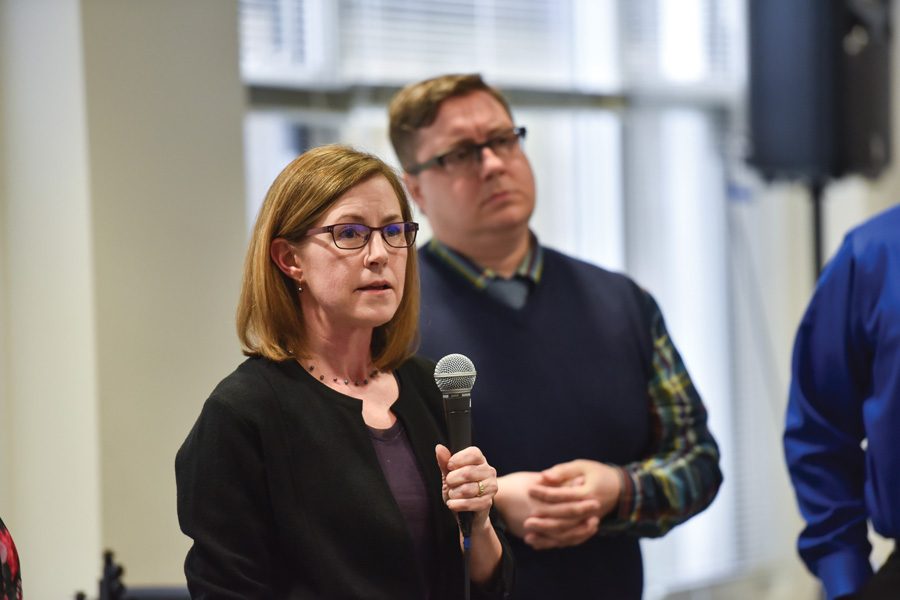Students ask administrators financial aid information at community dialogue
Katie Pach/Daily Senior Staffer
Angela Yang, director of operations for the Office of Undergraduate Financial Aid, and Brian Drabik, the office’s senior associate director, speak at a community dialogue Wednesday. At the dialogue, students voiced concerns about financial aid, health insurance and housing.
April 13, 2017
University administrators, faculty and students discussed concerns over financial support during a community dialogue Wednesday.
At the final community dialogue of the 2016-17 academic year, held in Allison Hall, students raised several questions about the University’s policies ranging from outside scholarships to student health insurance and the expected family contribution outlined in financial aid letters.
Vice president for student affairs Patricia Telles-Irvin said the dialogue focused on undergraduate financial support because many questions were asked at the last dialogue in February about the issue.
Weinberg senior Ashley Wood, who serves as Associated Student Government’s vice president for academics, said she often meets with administrators to discuss student concerns. She said these types of dialogues are helpful because they bring many administrators from different offices together.
“I am really impressed because I’m on the inside in a way,” Wood told The Daily about her role in ASG. “Maybe here there aren’t direct answers, but people are searching behind the scene. … I’m often surprised to see how proactive administrators are.”
Weinberg assistant dean for academic standing Constance Wright, who moderated the dialogue, said the points students make during dialogues are considered in subsequent meetings and guide discussions.
Students said the University should promote resources that aim to alleviate financial stress.
Administrators referenced Student Enrichment Services on numerous occasions as a resource for students. SES provides students with resources such as an online scholarship portal, laptop rentals and winter jackets.
However, due to its small size, SES needs help handling requests from all students, SESP adviser Meg Kreuser said. Kreuser said SESP has about 400 undergraduates, and she sends a lot of students who need resources to SES.
Students also said it would be beneficial to know which textbooks are required for courses ahead of time, so they can better prepare and find cheaper alternatives. Administrators said they could encourage department heads to tell professors to list class materials in their course descriptions.
Michael Mills, associate provost for University enrollment, said with the growing diversity of each undergraduate class, he is working to improve the undergraduate student experience by “evening out unevenness.”
Mills said the University will try to fix some institutional problems, including the “72-hour frenzy” when freshmen enroll in Fall Quarter classes at the end of Wildcat Welcome and have to acquire textbooks before they begin classes a few days later. He said some required textbooks and technology are expensive, such as the software MATLAB, which is used in McCormick School of Engineering classes.
“We’re looking at discussing the possibility of institutional site licenses for this growing number of educationally pertinent software packages,” Mills said.
Multiple students asked personal financial aid questions, but administrators could not give specific answers because of the individualized nature of the aid, Angela Yang, director of operations at the Office of Undergraduate Financial Aid, told The Daily.
However, Yang said the dialogue was beneficial because people asked questions and were engaged in the topic.
“It is difficult to discuss financial aid,” Yang said. “I know people are not always comfortable with our general response. They want to know what can be done for this quarter.”
Email: ericasnow2019@u.northwestern.edu
Twitter: @ericasnoww



